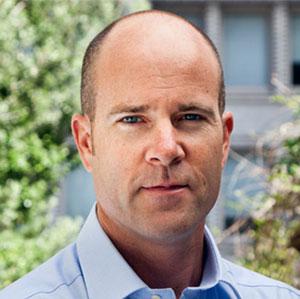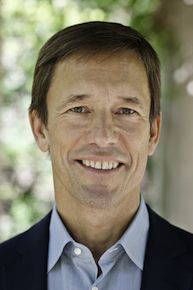We have found a new home! Kindly visit this link in our new website here: https://www.denver-frederick.com/2017/10/09/carter-roberts-president-ceo-world-wildlife-fund-joins-denver-frederick/
The following is a conversation between Carter Roberts, the President and CEO of World Wildlife Fund, and Denver Frederick, Host of The Business of Giving on AM 970 The Answer in New York City.

Carter Roberts © ImpactSpace
Denver: When my next guest was 29 years old, he made a list of the things he wanted to accomplish which included getting married, having three kids, seeing the Himalayas and the Arctic, and finally, leading a group of people in saving the most important places on earth. He has done pretty well with that list, including the final item. He is Carter Roberts, the President and CEO of the World Wildlife Fund.
Good evening, Carter, and welcome to The Business of Giving!
Carter: Thanks. Great to be here.
Denver: Why don’t we start by having you give us a snapshot of the World Wildlife Fund and the mission of the organization.
Carter: World Wildlife Fund. You may know us by our panda logo more than anything, but we were founded 55 years ago. We work in 100 countries around the world. People would think that we are nice people saving fuzzy animals, but our mission is all about creating a future for humanity on this earth in which we live in harmony with the planet… which means protecting nature and driving more sustainable behavior for all of us.
Denver: You know, Carter, the general public, I think, is often confused with all the different environmental and conservation and wildlife groups. What makes WWF distinctive? And what particular niche do you uniquely fill?
Carter: I’ve worked for a couple of groups in my career, and I’ve studied different groups. I love history, and I’ve often said: if you want to understand the group, you should look at the moment of conception– the first thing they did– because the DNA of that group is baked in in the very first thing they do.
Denver: Interesting perspective.
Carter: I was with the Nature Conservancy for 15 years. The first thing they did was: they were a group of scientists who were about to lose a place. They took out second mortgages, raised a lot of money to buy the land to keep it from being developed, and the idea of mobilizing capital to save nature is at the heart of what they do. And for WWF, we were founded 55 years ago, simultaneously in the UK, the Netherlands, the US and Switzerland to draw the world’s attention to the plight of animals and places around the world that we were losing, to raise the resources and mobilize people to save them.
So from the beginning, we were created as a global organization that would operate through communication, through elevating issues, and then getting people to converge on a single place, on a single issue, to make a difference before it’s too late.
Over the past 40 years, we have lost 50% of the populations of the world’s species, and that trend line is headed in the wrong direction with some notable positive exceptions. And on the other side, when I started this job, we were demanding in the world, 1.3 times what the planet could sustain. We just hit the 1.5 mark, and at this rate, we’re going to need two planets to survive this humanity. And, of course, there’s not another.
Denver: Well, sticking with the idea of global, one of your signature publications is the Living Planet Report. What were some of the highlights, as well as the trend lines from your most recent report?
Carter: Yeah. I wish I could tell you that that report is going in the right direction. We’ve been doing it for 40 years. We have two big measures of the world. One is a market basket of the world species and how those populations are doing over time. And the other measure is humanity’s footprint, or how much of the world does each person, on average, demand from the world in order to survive. And when I started this job, we had already seen a decline in the world’s population of species.
Over the past 40 years, we have lost 50% of the populations of the world’s species, and that trend line is headed in the wrong direction with some notable positive exceptions. And on the other side, when I started this job, we were demanding in the world, 1.3 times what the planet could sustain. We just hit the 1.5 mark, and at this rate, we’re going to need two planets to survive this humanity. And, of course, there’s not another.
Denver: Yes. That’s, I think, they call it “earth overshoot day”, and it’s really now, right at the very beginning of August when we’ve used up the resources in a single year.
Carter: It is. And for the remainder of the year, it’s the equivalent of a farmer eating his seed. It’s not a good thing.
Denver: No. You know, there have been a number of significant accomplishments that have occurred in the 12 plus years that you’ve been the CEO of WWF. But perhaps, none, any greater than your work in Brazil and creating a system of protected areas in the Amazon. How in the world were you able to achieve that?
Carter: Yeah. When I ask people and when I interview them, I always ask them: what are you most proud of? And if you ask me, beyond my personal life– actually my work life is my personal life– what are you most proud of? I would mention the Amazon because back in the day, 25 years ago, when the world knew it was losing its forests, we developed a partnership with the government of Brazil– President Cardozo– the World Bank, and a number of foundations– the Moore Foundation and the Global Environmental Facility– with the dream of creating a system of parks in the Amazon covering at least 10% of that part of the country.
And in the process, we have created a system of parks since then, equal to 125 million acres, that is larger than the state of California. And it’s the largest single conservation project anywhere in the world. And we have then taken the steps to create a consortium of groups around the world to finance it in a really cool, multi-party single closing that is performance-based… that gives the government of Brazil time to put in place the measures to hire the park guards, to finance all the equipment they need to make sure that those parks remain intact.
Denver: Let me pick up on that idea, if I can. About 15% of the world’s land is protected. And to finance that, it takes maybe $2.5 billion or so, of which we have a shortfall of $1.5 billion. So, some creative financing is called for there, and your effort around that is something called Project Finance for Permanence. What is that? And how does that work?
Carter: What we found is: it’s truly important to create a park. If you create a park, the level of deforestation drops by a bit. But if that park is not financed, and you don’t have the money to hire the park guards– boots on the ground– put up the signs, patrol the roads, all of that, then the level of deforestation jumps.
And so, with the government of Brazil, we estimated what would it cost to actually manage these parks. We looked at the gap between that and where the government of Brazil is now. We figured out how long it would take to put in place the measures to close that gap, and then we created a $215 million fund with the government of Norway, the World Bank, the Inter-American Development Bank, the Moore Foundation, the Global Environmental Facility, the government of Germany, and many others that came together from around the world to basically say, “Look, we will cover that transition but on a performance basis. So, we will pay out each year the government of Brazil takes a step in the right direction.”
And it has become a model that many other governments in the world now want to follow from Bhutan, to Peru, to Colombia, to even the DRC in Africa. And so, we are now looking at: how do you scale this up to do likewise in the most important forested of countries in the world?



